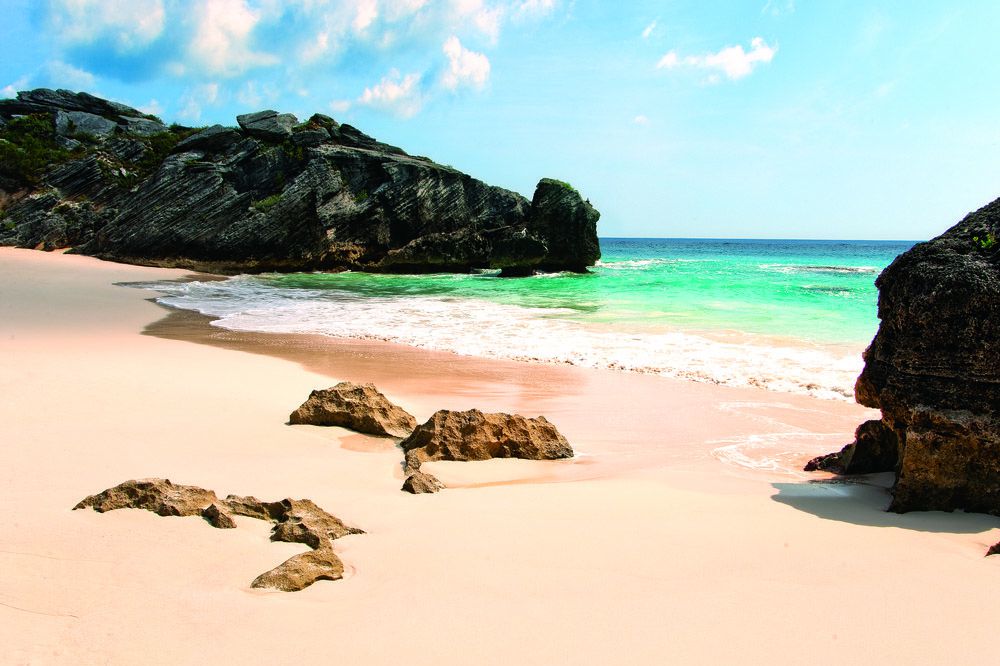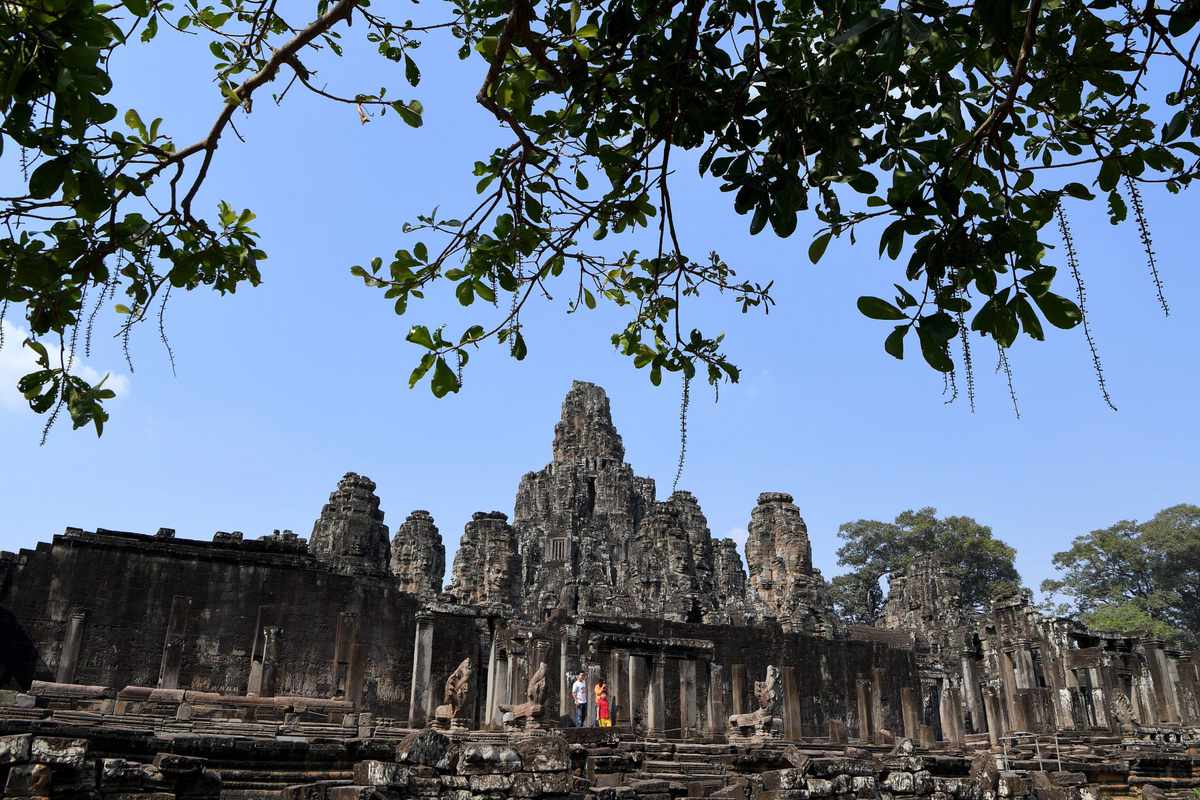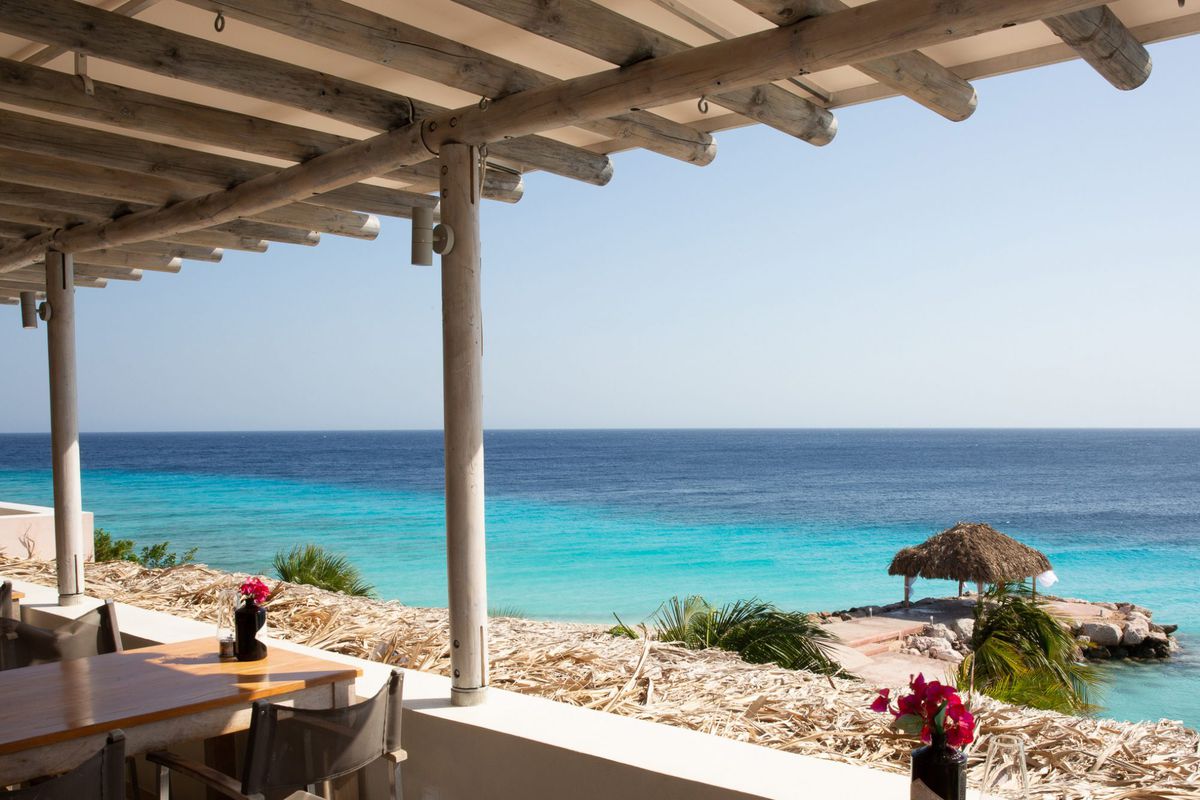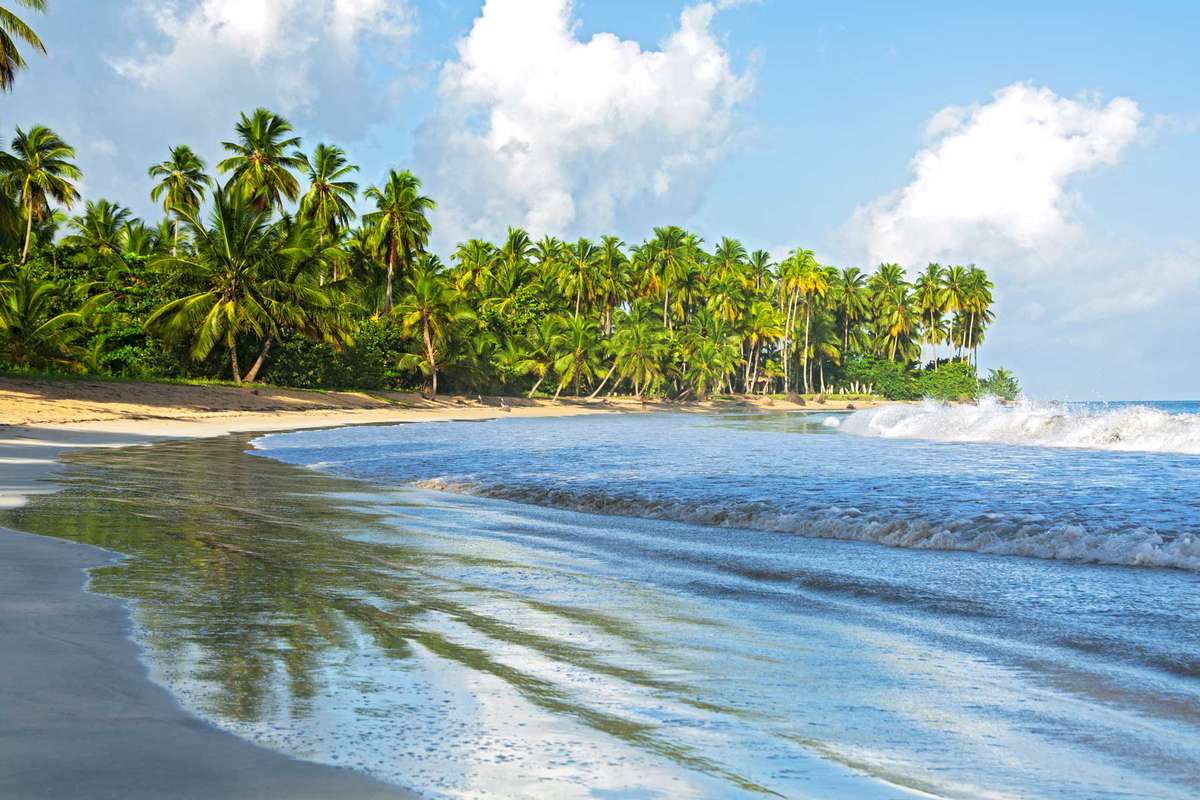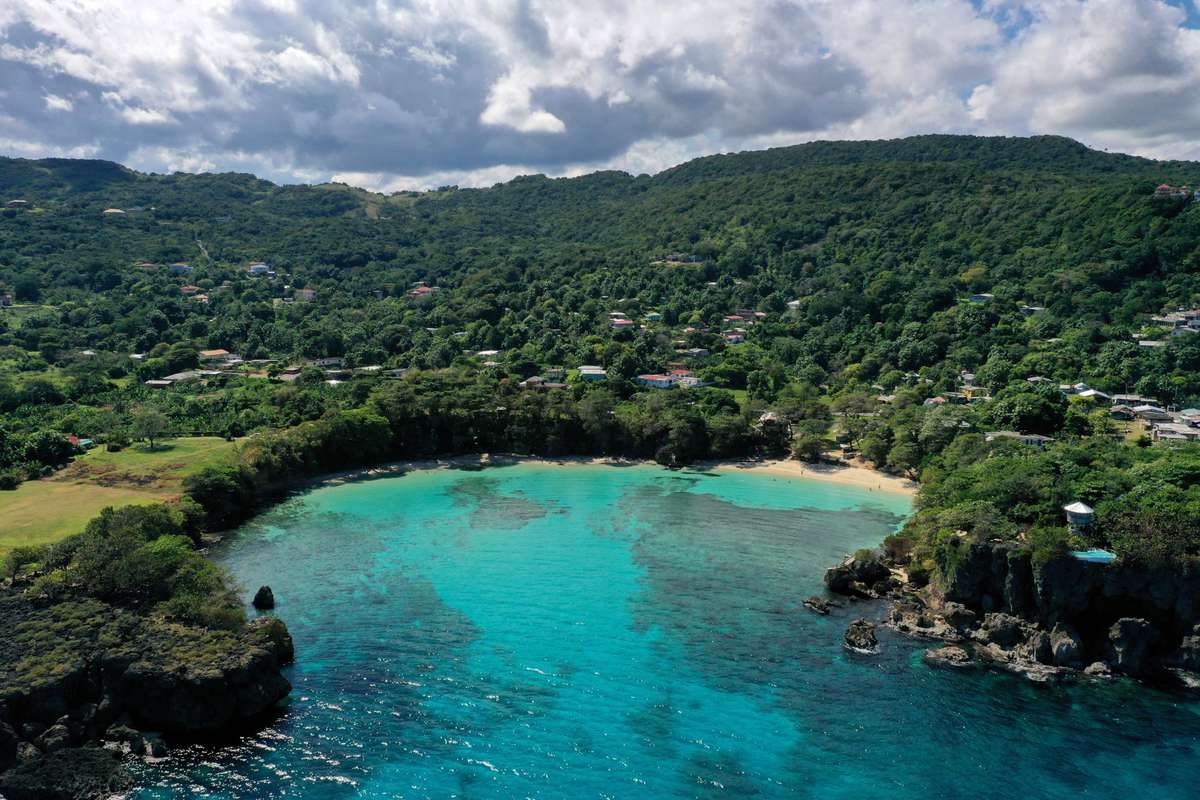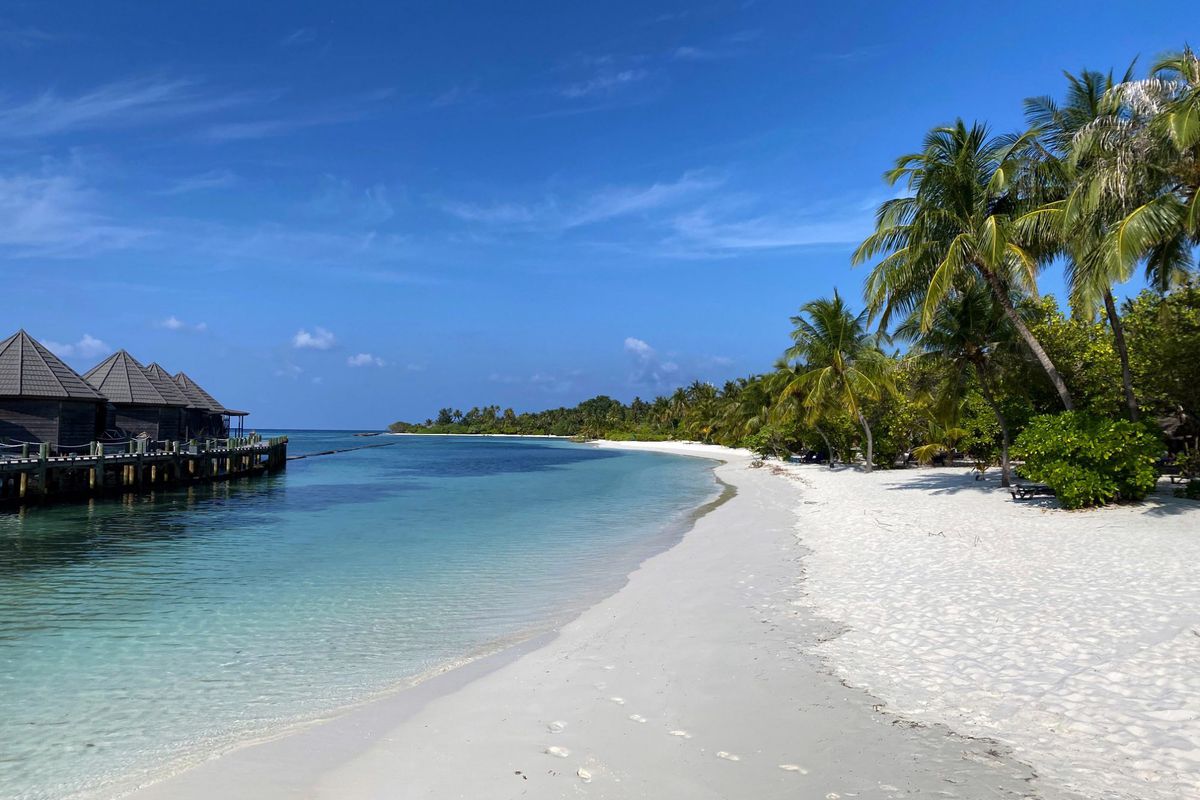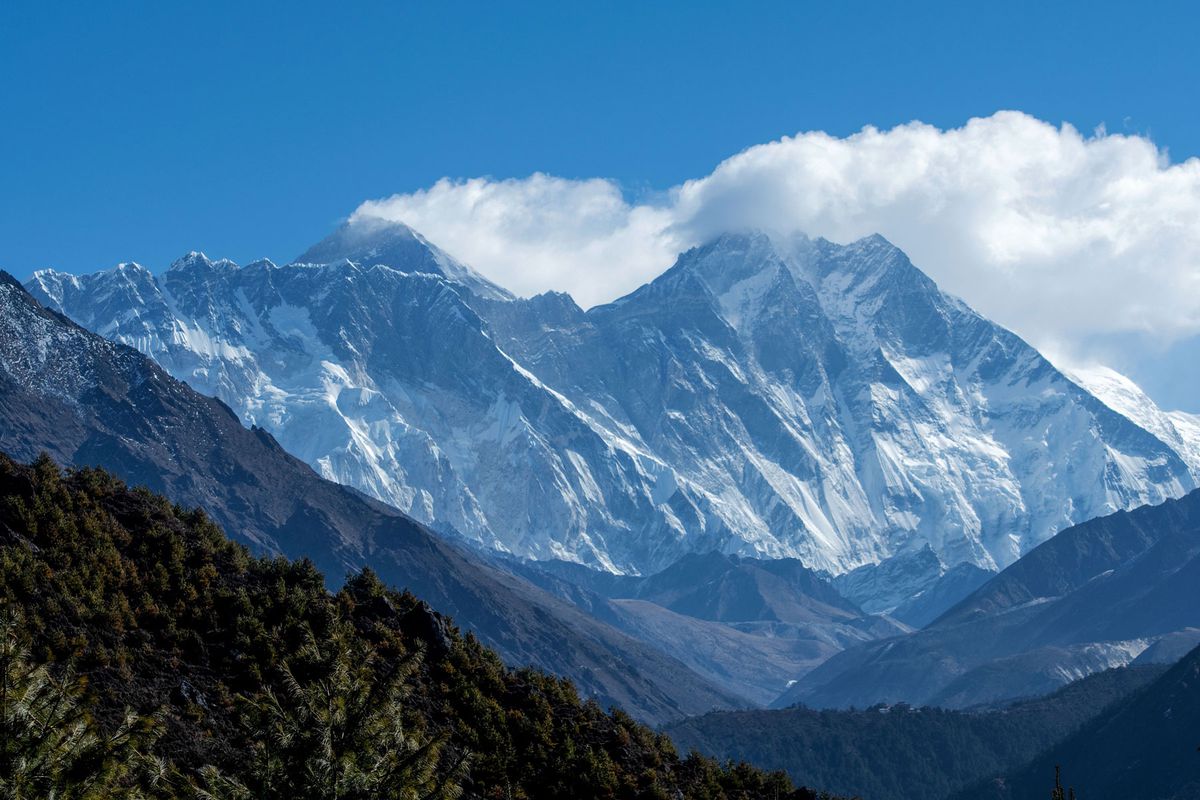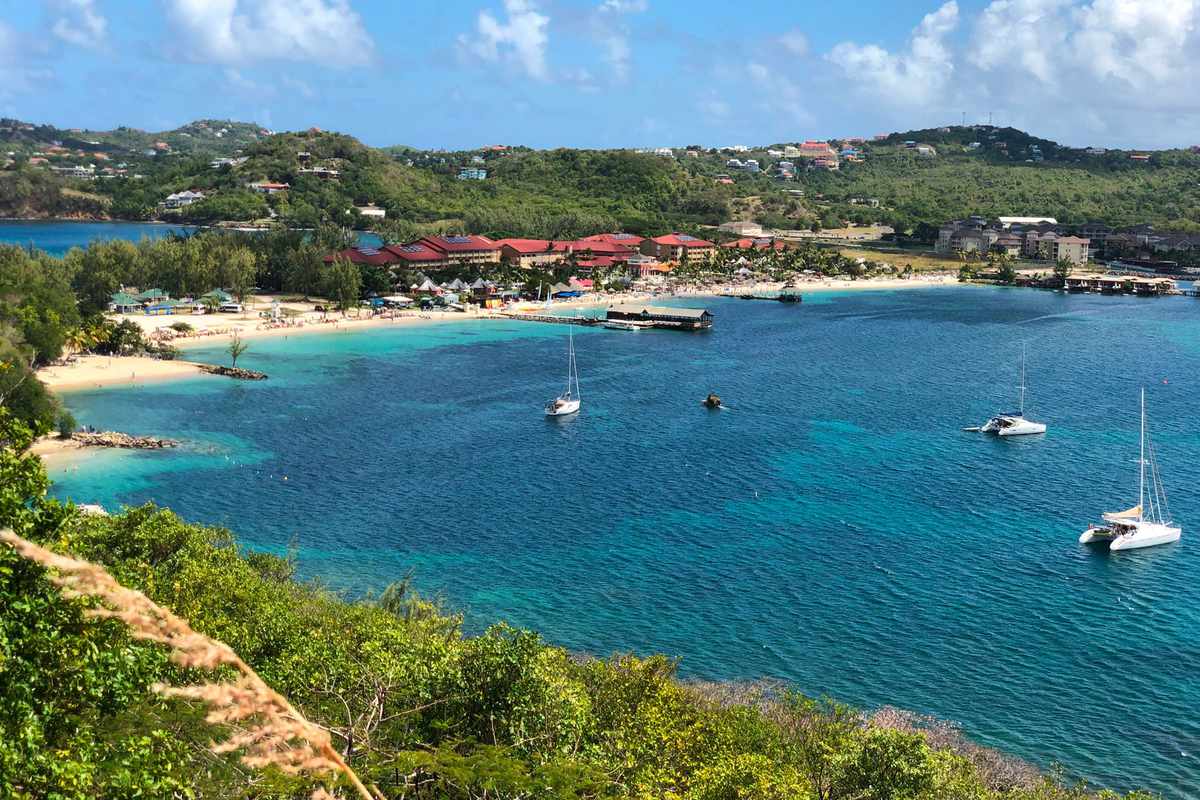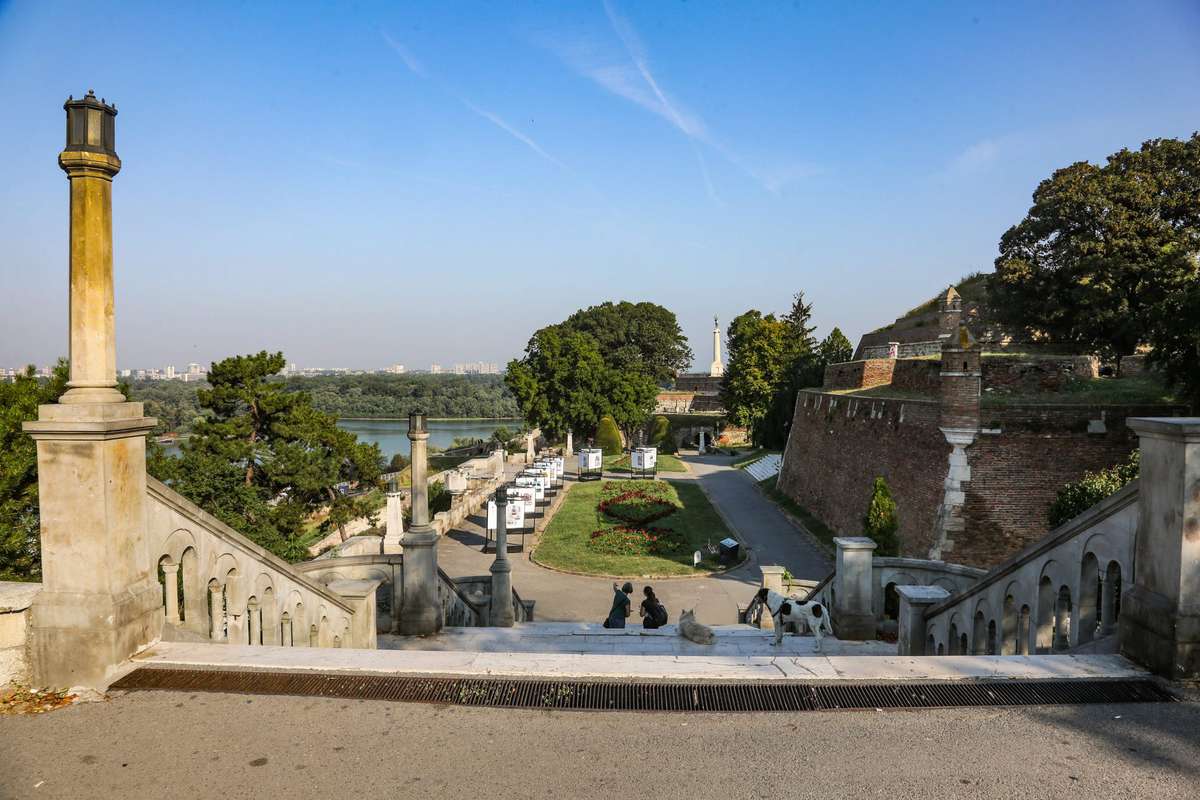
Editor's note: Those who choose to travel are strongly encouraged to check local government restrictions, rules, and safety measures related to COVID-19 and take personal comfort levels and health conditions into consideration before departure.
This year may not have brought an immediate end to the coronavirus pandemic, but it brought a renewed sense of hope. And many Americans are taking advantage of that feeling, looking ahead, and planning their next vacations.
The options for those who want to add another stamp to their passport have steadily grown since the world was first put on hold last year — albeit often with more paperwork, testing, and pre-planning required. Those who fly back to the United States will also be required to show a negative test before boarding a flight home. To provide even greater peace of mind to travelers, many airlines and airports have started offering on-site rapid COVID-19 tests.
Additionally, vaccinated travelers are now allowed to travel freely, according to updated guidance from the Centers for Disease Control and Prevention.
Below is a list of countries currently accepting American travelers along with each destination's travel protocol and their advisory level determined by the State Department. Countries that are accepting American travelers but require visitors to quarantine for two weeks upon arrival are also listed separately.
Albania
Level 4: Do Not Travel
U.S. citizens are allowed to enter Albania without showing any test results or being required to quarantine, according to the U.S. Embassy in Albania.
Albania requires anyone 11 years old or older wear masks in public, both indoors and outdoors. Restaurants and cafes in the country are open, but a nightly curfew was implemented in November.
Anguilla
Level 3: Reconsider Travel
The Caribbean island, which was declared COVID-19-free in November, is open to pre-approved tourists from certain countries, requiring them to apply in advance and submit a negative COVID-19 PCR test within three to five days before arriving.
Visitors also have to prove they have health insurance to cover potential medical expenses related to treatment of the virus and remain in an approved location for at least 10 days.
Antigua and Barbuda
Level 4: Do Not Travel
Visitors to Antigua and Barbuda over the age of 12 are required to arrive with a negative COVID-19 RT-PCR test from within seven days of their flight, according to the U.S. Embassy in Barbados, the Eastern Caribbean, and the OECS.
Visitors are then required to be monitored for COVID-19 for up to 14 days.
Listen to Travel + Leisure's "Let's Go Together" podcast for more inspiring stories about traveling the world with anxiety and more!
Armenia
Level 4: Do Not Travel
Americans can enter Armenia by air and must either arrive with a negative PCR COVID-19 test taken within 72 hours before arrival or get tested upon arrival at the airport, according to the U.S. Embassy in Armenia.
Face masks in public places are required in Armenia and those who do not comply could face a fine.
Aruba
Level 4: Do Not Travel
Aruba requires all U.S. residents to complete an Embarkation/Disembarkation card, a personal health assessment, and show a negative COVID-19 test, which can be either taken up to 72 hours before departure and uploaded in advance of coming or completed upon arrival.
The island, which started reopening outdoor restaurants on May 25, has a cleaning and hygiene certification program for tourism-related businesses focusing on things like plexiglass barriers at desks.
Bahamas
Level 4: Do Not Travel
Travelers to the Bahamas can skip the islands’ mandatory quarantine if they test negative for COVID-19 within five days before their departure, along with applying for a Bahamas Health Travel Visa after their test. Travelers will then have to take a second, rapid antigen test on day 5 of their visit.
Children 10 years old and younger will not need to get tested prior to arrival.
Visitors are then required to opt-in to mandatory COVID-19 health insurance when applying for their Health Travel Visa.
The Bahamas requires everyone to wear masks in public.
Barbados
Level 4: Do Not Travel
Following several deaths due to the variant of COVID-19 detected in the UK, Barbados recently tightened its rules for entry. Now, all travelers will be required to take a COVID-19 test upon arrival and will have to quarantine for five to seven days instead of three, Barbados' Prime Minister Mia Mottley announced in a press conference on Jan. 27.
Fully vaccinated travelers who have received either the AstraZeneca, Moderna, Pfizer-BioNTech, or Johnson & Johnson vaccinations will be able to shorten their quarantine to one or two days. Children under 18 who are traveling with vaccinated adults will be able to adhere to the vaccinated protocols.
Barbados is encouraging visitors to move there for a year for the ultimate work from home experience.
Bahrain
Level 4: Do Not Travel
The government has resumed issuing visas upon arrival for eligible nationalities — including the U.S. — and requires passengers to be tested upon arrival for COVID-19 at their own expense, according to the U.S. Embassy in Bahrain. Passengers who test negative are not required to quarantine. Children under six are exempt from testing on arrival.
Travelers who remain in Bahrain for 10 days or longer will be retested on the 10th day.
Belarus
Level 4: Do Not Travel
U.S. travelers to Belarus are allowed to enter the country without any COVID-19 restrictions in place, according to the U.S. Embassy in Belarus.
Travelers should expect to undergo temperature checks at the airport.
Belize
Level 2: Exercised Increased Caution
Visitors to Belize need to book with a hotel that complies with their nine-point initiative, entitled the Tourism Gold Standard Recognition Program, in which the approved hotels — listed on their tourism site — have implemented health and safety standards including online check-in and check-out and mandatory mask-wearing in public spaces.
Visitors will need to download the Belize Health App at least three days before boarding a fight, which can be used for contact tracing and reporting health symptoms. Travelers have the option to take a COVID-19 PCR test within 96 hours of departure or a rapid antigen test within 48 hours of departure.
Fully vaccinated travelers who can prove it has been two weeks since their final shot are exempt from the testing requirements.
Bermuda
Bolivia
Level 4: Do Not Travel
The Bolivian Government requires travelers to arrive with a negative COVID-19 PCR test taken within 10 days if coming from a country in North America, Europe, or Asia, according to the U.S. Embassy in Bolivia. Passengers should also expect to undergo temperature checks.
Face masks are required to be worn in public places.
Botswana
Level 3: Do Not Travel
U.S. travelers can enter the country if they have a negative COVID-19 PCR test within 72 hours of their departure for Botswana, according to the U.S. Embassy in Botswana. U.S. citizens who do not meet testing requirements will have to quarantine for 14 days.
Travelers must also show a second negative PCR test taken within 72 hours of their departure from the country.
Brazil
Level 4: Do Not Travel
Foreign visitors are required to show proof of a negative COVID-19 PCR test taken within 72 hours prior to boarding a flight to the country. Travelers will also have to fill out a Traveler's Health Declaration online. Children under 12 years old who are accompanied and all children under 2 are exempt from testing.
Bonaire
Level 4: Do Not Travel
Americans can travel to Bonaire via Curacao and must arrive with a negative COVID-19 PCR test taken within 72 hours of their departure, according to the government. Travelers must also complete an online health declaration form 72 hours to 48 hours before departure.
Bosnia and Herzegovina
Level 4: Do Not Travel
U.S. citizens can travel to Bosnia and Herzegovina as long as they present a negative COVID-19 PCR test no older than 48 hours from their arrival, according to the U.S. Embassy in Bosnia and Herzegovina.
Restaurants, cafes, and most businesses are open in Bosnia and Herzegovina, but a nightly curfew remains in place. Masks are required in public places.
Botswana
Level 4: Do Not Travel
U.S. travelers can enter the country if they have a negative COVID-19 PCR test within 72 hours of their departure for Botswana, according to the U.S. Embassy in Botswana. U.S. citizens who do not meet testing requirements will have to quarantine for 14 days.
Cambodia
Level 3: Reconsider Travel
U.S. and other foreign travelers can take advantage of the amazing temples in Cambodia (hello Angkor Wat), but it will cost them. The country requires visitors to pay a hefty travel deposit before entering to cover any potential coronavirus-related costs.
Travelers are required to pay a $2,000 deposit upon arrival at the airport, show a negative COVID-19 medical certificate from no more than 72 hours prior to arrival, and purchase a local health insurance package, according to the U.S. Embassy in Cambodia.
Travelers must then undergo a COVID-19 test upon arrival and quarantine before being re-tested on the 13th day.
Chile
Level 4: Do Not Travel
Chile requires travelers to show proof of a negative COVID-19 PCR test taken within 72 hours of boarding their flight, according to the U.S. Embassy in Chile. Travelers must also complete an online "Affidavit of Travelers" and show proof they have health insurance that covers COVID-19 while there.
Travelers must then quarantine and can leave quarantine with a negative PCR test taken on or after the seventh day.
Chile requires masks be worn in all urban areas and has implemented a nightly curfew.
Colombia
Level 4: Do Not Travel
U.S. citizens are allowed to enter Colombia and must complete the Migracion Colombia's Check-Mig immigration form and show a negative PCR test from no more than 96 hours before departure, according to the U.S. Embassy in Colombia. Quarantine is not required, but travelers may be greeted with other protocols upon arrival.
Limited international flights have resumed to several of the country's busiest airports, including Bogota, Cartagena, and Medellin, but the country's water and land borders remain closed.
Costa Rica
Level 4: Do Not Travel
Costa Rica started welcoming visitors from the U.S. on Sept. 1, initially starting with travelers from the northeast, the Minister of Tourism confirmed to Travel + Leisure. That list expanded on Nov. 1, 2020 when the country started welcoming visitors from all U.S. states.
Travelers must complete an online Health Pass form within 48 hours of boarding a flight and show proof of travel insurance that covers medical expenses and accommodation in case they are forced to quarantine.
This follows the country’s reopening for international visitors from several other countries in August, including from Canada, Europe, Japan, South Korea, Singapore, Australia, and New Zealand.
Croatia
Level 4: Do Not Travel
While Croatia initially welcomed tourists from non-EU countries, including Americans, with proof of a hotel stay and a negative test, that has since changed. Now, people who travel to Croatia from an EU or EEA country (including Americans who have been in Europe) as well as certain other countries, including Australia and Japan, can visit, according to the Croatian Ministry of Interior.
Those who are coming from a country on the European Centre for Disease Prevention and Control’s green list do not need to provide a negative test, while those coming from countries not on the green list must show proof of a negative COVID-19 test taken within 48 hours.
While the European Union has recommended the U.S. not be included in the countries allowed to resume non-essential travel, individual countries are able to make their own decisions.
Curaçao
Level 4: Do Not Travel
Americans can visit if they show proof of a negative COVID-19 PCR test no more than 72 hours before departure, and fill out an online immigration card and Passenger Locator Card within 48 hours of their departure, according to the Curaçao Tourist Board. Travelers must also have medical insurance to cover them if they become ill with the virus while visiting.
The island, which asks people to wear face masks if they cannot be at least 6 feet apart, has also introduced a “Dushi Stay” app — dushi meaning “sweet” in Papiamentu — to help visitors keep track of everything from entry requirements to which restaurants, attractions, and beaches are open.
Democratic Republic of the Congo
Level 4: Do Not Travel
Americans can travel to the Democratic Republic of the Congo and are required to provide proof of a negative COVID-19 test taken within seven days of their departure, according to the U.S. Embassy in the Democratic Republic of the Congo. Children under 11 years old are exempt.
Travelers must also register online before departure and will be tested again at the airport once they arrive at their own expense — about $45 — self quarantining until they receive a negative result (usually within 24 hours). Travelers will also have to get re-tested within three days of their plans to leave the country.
In addition to COVID-19 measures, travelers must show a World Health Organization card with proof of a yellow fever vaccination.
Djibouti
Level 3: Reconsider Travel
U.S. travelers can enter Djibouti with proof of a negative COVID-19 test taken within 72 hours of boarding a flight to the country and not more than 120 hours before arriving, according to the U.S. Embassy in Djibouti. Upon arrival, passengers will be tested again with a saliva test, which costs about $30. If a large percentage of a flight tests positive with the saliva test, the government may require a follow-up nasal swab test.
Dominica
Level 3: Reconsider Travel
Travelers from high-risk countries (which includes the U.S.) must show a negative COVID-19 PCR test taken 24 to 72 hours before arrival and submit an online health questionnaire at least 24 hours prior to arrival.
Upon arrival, travelers will also have to undergo a rapid test. If it is negative, travelers will be taken to either a “Safe in Nature” certified property or a quarantine location for at least five days. On the fifth day, travelers will be re-tested and can be medically cleared if that result is negative.
Dominican Republic
Level 4: Do Not Travel
As part of the Dominican Republic's "Responsible Tourism Recovery Plan," visitors are no longer required to show proof of a negative COVID-19 test in order to enter the country. Additionally, mass testing will not be performed at the airport upon arrival, but will instead be done at random.
Travelers must also fill out a Traveler's Health Affidavit online. To ease concerns of would-be travelers, the Ministry of Tourism is offering tourists visiting hotels a temporary, free travel assistance plan for those who arrive by at least March 31. In addition to general emergency coverage, the free insurance plan covers coverage for long-term stays should a traveler fall ill or need to quarantine.
Ecuador
Level 4: Do Not Travel
Since Aug. 15 travelers to Ecuador have been allowed to skip the mandatory quarantine if they show proof of a negative COVID-19 test taken no more than ten days before arrival and exhibit no symptoms, according to the U.S. Embassy & Consulate in Ecuador.
The Galapagos has its own restrictions, including requiring travelers to show a negative PCR test taken no more than 96 hours before arrival to the islands.
Egypt
Level 4: Do Not Travel
U.S. tourists must secure a visa to visit Egypt, according to the State Department. Travelers must show proof of a negative COVID-19 PCR test taken no more than 96 hours prior to their flight, according to the U.S. Embassy in Egypt. Travelers must have a paper copy of the results as digital results will not be accepted.
Tourists must also show proof of health insurance upon arrival.
Visitors who do go to Egypt will notice health and safety protocols at hotels, including electronic check-in, temperature checks, and sanitization of luggage, according to the country's tourism site.In the meantime, explorers can check out this virtual tour of the tomb of Pharaoh Ramses VI from home, allowing people to exercise their inner adventurer without leaving the couch.
El Salvador
Level 3: Reconsider Travel
Americans are allowed to enter El Salvador, and required to present a negative COVID-19 PCR test within 72 hours of boarding a flight, according to the U.S. Embassy in El Salvador.
Ghana
Level 3: Reconsider Travel
Travelers must present a negative COVID-19 PCR test no more than 72 hours before departure, according to the U.S. Embassy in Ghana. Travelers must then undergo a second test upon arrival at the airport, which costs $150 per person.
Face coverings are required in public in Ghana.
Grenada
Level 3: Reconsider Travel 2: Exercise Increased Caution
Travelers to the island must present a negative COVID-19 PCR test from at least three days before traveling there, according to the Ministry of Health Grenada, and have the option of getting re-tested on day five of their trip to leave their hotel. Before traveling, visitors must receive a Pure Safe Travel Certificate, which they can apply for online.
Travelers must pay a one-time $150 COVID-19 test fee, have travel medical insurance that covers any COVID-19-related illness, and have a minimum seven-day reservation at an approved accommodation in order to quarantine.
Guatemala
Level 4: Do Not Travel
Guatemala requires travelers aged 10 and over to show a negative COVID-19 PCR or antigen test conducted within 96 hours before their departure, according to the U.S. Embassy. Travelers must also fill out an online immigration pre-check form.
Travelers to Guatemala will also be required to complete a Health Pass online before arriving.
Masks are required in public spaces in the country.
Honduras
Level 3: Reconsider Travel
Travelers can enter Honduras if they possess a negative COVID-19 test, according to the U.S. Embassy in Honduras.
Honduras requires face masks to be worn in public and has a nightly curfew in place.
Iceland
Level 3: Reconsider Travel
Iceland began accepting travelers from the U.S. and countries outside the Schengen zone starting April 6. As of now, they are welcoming only travelers with a vaccine approved by the European Medicines Agency (which includes Pfizer-BioNTech, Moderna, AstraZeneca, or Johnson & Johnson). Travelers who are fully vaccinated will not have to quarantine upon arrival.
Ireland
Level 4: Do Not Travel
American travelers to Ireland must show proof of a negative COVID-19 PCR test taken within 72 hours of their arrival, according to the government. Children 6 and under are exempt. Once in Ireland, travelers can test-out of quarantine if they test negative with a COVID-19 PCR test at least five days after arriving in the country. Tourists are also required to fill out a contact tracing form.
Jamaica
Level 4: Do Not Travel
Jamaica requires arriving passengers to show either a negative COVID-19 PCR or antigen test from a certified lab taken within ten days of boarding a flight, according to the country's tourism board. Children under 12 years old are exempt.
Travelers must also complete a Travel Authorization form online, and can stay in a "resilient corridor" where they can leave the resort to visit certified tourist attractions.
The island also introduced protocols for tourism industries, including requiring each hotel to designate at least one employee at a time as a "COVID-19 Safety Point Person" to conduct spot checks.
Kenya
Level 4: Do Not Travel
Travelers from the U.S. are allowed to enter Kenya as long as they present a negative COVID-19 PCR test taken within 96 hours of travel, don’t have a temperature above 99.5 degrees Fahrenheit, and don’t have symptoms of the virus, according to the U.S. Embassy in Kenya.
Travelers need to digitally verify their tests through the Trusted Travel (TT) Initiative.
Travelers who leave Kenya must also get a second negative PCR test and verify it through the same system.
Restaurants and bars in Kenya must close by 9 p.m.
Kosovo
Level 4: Do Not Travel
U.S. citizens must provide a negative COVID-19 PCR test within 72 hours before arriving to enter Kosovo, according to the U.S. Embassy in Kosovo. If they don’t have a test, they are required to self-isolate for seven days.
A nightly curfew is in place.
Lebanon
Level 4: Do Not Travel
U.S. travelers to Lebanon must arrive with a negative COVID-19 PCR no more than 96 hours old, according to the U.S. Embassy in Lebanon. Visitors will have to take another PCR test at the airport and quarantine for up to 72 hours at a designated hotel until they receive a negative result.
Travelers then have to self-isolate for the rest of the week and take another PCR test.
A nightly curfew has been implemented.
Maldives
Level 4: Do Not Travel
Americans looking to take advantage of the luxury of overwater bungalows need to look no further than the Maldives. The island nation first reopened its uninhabited islands, followed by inhabited islands on Aug. 1. Visitors must show a negative COVID-19 PCR test within 96 hours of their departure, according to the Ministry of Tourism.
Mexico
Level 4: Do Not Travel
The land border between the U.S. and Mexico is currently limited to essential travel.
While several states in Mexico reopened for tourism, including Quintana Roo (where popular spots like Cancun are located) as well as Jalisco (where Puerto Vallarta is), further restrictions have since been implemented. Mexico has created a color-coded system for each state, according to the U.S. Embassy & Consulates in Mexico, and has placed several states, including Jalisco and Quintana Roo, in the "orange" category, allowing hotels and restaurants to open with 50 percent capacity.
The Centers for Disease Control and Prevention, however, warned Americans about traveling to Mexico amid increasing cases, raising its COVID-19 level to red in December, its highest marker.
Montenegro
Level 4: Do Not Travel
Visitors to Montenegro are required to show either a negative COVID-19 test or a positive antibody test from within 72 hours of arrival in the country, according to the U.S. Embassy in Montenegro.
Face masks are required in all public areas in the country and a nightly curfew has been enacted.
Morocco
Level 3: Reconsider Travel
Foreign nationals of visa-exempt countries, including the U.S., are allowed to enter Morocco starting as long as they have a reservation with a Moroccan hotel or travel agency, according to the U.S. Embassy & Consulate in Morocco.
Travelers to the country have to show a COVID-19 PCR test taken within 72 hours and have the results printed with them. Children under 11 years old are exempt.
Upon arrival, government officials will also conduct a health screening.
Those wishing to enter or leave Casablanca must have a letter of permission from Moroccan authorities.
Namibia
Level 4: Do Not Travel
Travelers to Namibia from the U.S. must show a negative COVID-19 PCR test taken within seven days of arrival, according to the U.S. Embassy in Namibia. Visitors are able to enter under the country's Tourism Revival Initiative.
Nepal
Level 3: Reconsider Travel
Nepal has reopened for some visitors, but they have to be going to climb the country’s impressive peaks. Those who meet that requirement must obtain a visa in advance, arrive with a negative COVID-19 PCR test taken within 72 hours, and already have a hotel booking in order to quarantine for at least seven days in the country (before being required to take a second coronavirus test on their fifth day at their own expense), according to the Nepal Tourism Board.
They also have to have insurance that would cover at least $5,000 per person in case they contract COVID-19.
Nicaragua
Level 4: Do Not Travel
Nicaragua allows travelers from the U.S. to come as long as they have a negative COVID-19 test in hand, according to the U.S. Embassy in Nicaragua. U.S. travelers are not required to quarantine upon arrival.
North Macedonia
Level 4: Do Not Travel
U.S. travelers to North Macedonia are not required to have any COVID-19 tests or quarantine upon arrival, according to the U.S. Embassy in North Macedonia.
The country's Skopje International Airport requires passengers to disinfect their hands and wear a mask inside the terminal. In North Macedonia, indoor bars and restaurants, and gyms were allowed to reopen in June.
Pakistan
Level 4: Do Not Travel
Travelers to Pakistan from the U.S. must provide contact information through the country's PassTrack mobile app or online, undergo a health screening, and provide proof of a negative COVID-19 PCR test from within 96 hours of traveling, according to the Government of Pakistan.
At the airport, arriving passengers will be required to line up six feet apart and undergo a thermo-screening by thermo-guns and/or thermo-scanners, according to the U.S. Embassy & Consulates in Pakistan.
Panama
Level 4: Do Not Travel
Travelers to Panama are required to present negative COVID-19 test results taken within 48 hours of their arrival. Those who have older test results will be required to undergo a rapid COVID-19 test at the airport.
Travelers must also complete an electronic affidavit, agreeing to comply with the Ministry of Health’s COVID-19 measures in Panama.
Face masks are required in all public spaces in Panama and electronic payments at shops and restaurants are preferred to reduce person-to-person contact.
Peru
Level 4: Do Not Travel
Americans can enter Peru as long as they have either a negative COVID-19 PCR, negative antigen test, or medical certificate of epidemiological discharge from within 72 hours of departure and do not have any COVID-19 symptoms, according to the U.S. Embassy in Peru. Children under 12 years old can show a certificate of health from a doctor in lieu of a negative test. The South American nation reopened its borders to the world and welcomed tourists back to its iconic archeological site, Machu Picchu.
Rwanda
Level 3: Reconsider Travel
Travelers are allowed to go to Rwanda, but must present proof of a negative COVID-19 PCR test taken no more than 72 hours before their flight, according to the U.S. Embassy in Rwanda. Upon arrival, visitors must undergo a second test at Kigali International Airport, which costs $60 and wait 24 hours for the results in a designated hotel. All travelers must also fill out a Passenger Locator Form with passport information, travel details, and booking confirmation.
While many visitors to Rwanda are required to quarantine for at least 7 days in a hotel and undergo a second round of testing, international tourists who are scheduled to visit a national park are exempt from the 7-day quarantine period, according to Visit Rwanda, the Rwanda Development Board. To skip the quarantine, travelers will have to show proof of their visit upon arrival.
Additionally, international tourists must schedule their visit to a national park within 72 hours of receiving a negative test result.
When travelers are ready to leave the country, they must test negative for the virus once again before their scheduled departure.
St. Kitts and Nevis
Level 2: Exercise Increased Caution
Travelers to St. Kitts and Nevis must submit a negative COVID-19 RT-PCR test 72 hours before arrival and fill out an entry form online, according to the U.S. Embassy in Barbados, the Eastern Caribbean, and the OECS. Visitors must also download the SKN COVID-19 contact tracing app.
Travelers will have to quarantine upon arrival at an approved hotel, but will be able to move around the hotel’s property and participate in hotel activities. On the seventh day, visitors will get re-tested and, if they test negative, can book excursions through the hotel. Travelers who stay 14 days or longer will get re-tested again.
St. Lucia
Level 4: Do Not Travel
Travelers to St. Lucia are required to obtain a negative COVID-19 test within five days before their arrival and complete a pre-arrival registration form, according to the U.S. Embassy in Barbados, the Eastern Caribbean, and the OECS. Travelers must then have a confirmed reservation at a COVID-19 certified accommodation for the duration of their stay.
Saint Lucia has implemented a COVID-19 certificate for hotels, requiring them to meet more than a dozen criteria for sanitization protocols, social distancing, and more.
St. Vincent and the Grenadines
Level 4: Do Not Travel
Visitors to St. Vincent and the Grenadines have to complete a pre-arrival form, which can be accessed online, according to the U.S. Embassy in Barbados. Travelers from the U.S. also need to show a negative COVID-19 PCR test taken within 72 hours of arrival as well as get re-tested upon arrival.
Travelers will then need to complete a 14-day mandatory quarantine in a Tourism Authority/Ministry of Health, Wellness, and the Environment-approved hotel. Visitors must have a fully paid reservation in advance. Visitors will then be re-tested again between days four and seven of their quarantine.
Sint Maarten
Level 3: Reconsider Travel
U.S. travelers heading to Sint Maarten have to fill out an online immigration card prior to travel, according to the U.S. Consulate General in Curacao. Travelers must also present a negative COVID-19 PCR test taken within 120 hours of arrival.
Senegal
Level 3: Reconsider Travel
Travelers to Senegal are allowed to enter as long as they show a negative COVID-19 PCR test within five days before arrival, according to the U.S. Embassy in Senegal. Airlines will check tests before boarding. Children under two years old are exempt.
Senegal requires masks be worn in public and private places, while restaurants, markets, and private beaches have been allowed to reopen.
Serbia
Level 4: Do Not Travel
Serbia requires visitors to show proof of a negative COVID-19 PCR or rapid antigen test taken within 48 hours of arrival, according to the U.S. Embassy in Serbia. Children under 12 with a guardian are exempt.
In Serbia, masks are required in all indoor locations as well as outdoors when physical distancing is not possible, and there is a ban on public gatherings for more than five people. Serbia also happens to have one of the best under-the-radar wine regions in Europe, perfect for some off-the-beaten-path exploring.
Seychelles
Level 4: Do Not Travel
Seychelles has opened its borders to vaccinated visitors from all countries. Travelers who had been fully vaccinated for two weeks are allowed to visit. However, starting March 25, visitors regardless of their inoculation status will be allowed to visit with a negative PCR test taken 72 hours prior to departure and no quarantine requirement.
South Africa
Level 4: Do Not Travel
South Africa reopened its borders to all international travel in November with testing requirements in place. Travelers need to show a negative COVID-19 test no older than 72 hours from the time of their departure, according to the U.S. Embassy & Consulates in South Africa, as well as install the COVID Alert South Africa mobile app.
Tanzania
Level 4: Do Not Travel
The suspension on international flights to Tanzania has been lifted, according to the U.S. Embassy in Tanzania, and travelers are expected to fill out a Health Surveillance Form on the plane.
Turkey
Level 4: Do Not Travel
Turkey requires all international passengers 6 years old and older to arrive with a negative COVID-19 PCR test taken within 72 hours of their flight, according to the U.S. Embassy & Consulates in Turkey. Travelers need to show the test to the airline during check-in.
Visitors are not required to quarantine upon arrival. A nightly curfew has been implemented, but foreign tourists are exempt.
Turks and Caicos
Level 4: Do Not Travel
In order to visit the island, visitors need to apply for a travel authorization, upload a negative COVID-19 PCR test taken within five days of travel, have insurance that covers COVID-19 costs, and complete a health screening questionnaire, according to the Minister of Tourism. Children under 10 years old are exempt from the testing requirement.
Uganda
Level 3: Reconsider Travel
Uganda has reopened its borders and national parks to international travelers able to produce evidence of a negative COVID-19 PCR test taken within 120 hours of their departure, according to the U.S. Embassy in Uganda. Visitors to Uganda will also have to pass health screenings including temperature checks.
Passengers will again need to test negative for COVID-19 within 120 hours of their departure from Uganda.
Uganda is requiring all travelers to wear masks covering both their mouths and noses while traveling through its airport or visiting its 10 national parks. Inside airport terminals, Uganda is requiring that people keep at least five feet from one another. It’s requiring six-and-a-half feet of distance between people visiting national parks, and charging tour guides with making sure visitors keep at least 32 feet from any primates they encounter.
Ukraine
Level 4: Do Not Travel
Ukraine considers the U.S. a country with a high incidence of COVID-19, and requires citizens to either self-quarantine, take a COVID-19 test upon arrival at the international airports and quarantine until they get the results, or arrive with a negative COVID-19 PCR test from within 72 hours, according to the U.S. Embassy in Ukraine.
U.S. citizens visiting Ukraine must also show they have medical insurance to cover any COVID-19-related expenses.
It is mandatory to wear masks in indoor public places, according to the embassy.
United Arab Emirates
Level 4: Do Not Travel
Visitors to the UAE are allowed to enter as long as they show proof of a negative COVID-19 test taken within 96 hours, according to the U.S. Embassy & Consulate in the United Arab Emirates.
Visitors are also required to have medical travel insurance that covers COVID-19, according to the Dubai Corporation of Tourism & Commerce Marketing. The airport will also implement thermal temperature screenings.
In addition, Ras Al Khaimah (which received a “Safe Travel Label” from the World Travel & Tourism Council) allowed international visitors to arrive, mandating many of the same requirements as Dubai. In order to stay in Ras Al Khaimah, travelers must have a hotel booking confirmed as well as sign a health declaration form.
United Kingdom
Level 4: Do Not Travel
Travelers to the United Kingdom must obtain a negative COVID-19 test taken within three days of traveling, according to the UK government. Children under 11 are exempt. The UK then allows many international visitors, including from the U.S., to test-out of the country's quarantine (previously 14 days) after only five days.
Travelers must self-isolate for the five days before getting a test, which they have to book and pay for from an approved private provider in advance of traveling. Travelers must also complete a passenger locator form.
Zambia
Level 3: Reconsider Travel
Tourists must arrive with a negative COVID-19 test taken within seven days of travel, according to the U.S. Embassy in Zambia.
Those flying into Zambia will also be required to fill out traveler health questionnaires and random testing could be performed at the airport. Wearing masks in Zambia is mandatory, according to the country's tourism agency.
Zimbabwe
Level 2: Exercise Increased Caution
Zimbabwe has reopened its borders for game drives and more, requiring visitors to arrive with a negative COVID-19 PCR test from 48 hours of their departure, according to the U.S. Embassy in Zimbabwe.
Travelers should also expect to be subject to temperature checks, and masks are mandatory, the Zimbabwe Tourism Authority noted. A nightly curfew is in effect.
The following countries are also accepting travelers coming from America, but require a mandatory quarantine or self-isolation period:
- Bangladesh
- Ethiopia
- Haiti
- Liberia
- Niger
- Nigeria
- Mauritius
- South Korea
Alison Fox is a contributing writer for Travel + Leisure. When she’s not in New York City, she likes to spend her time at the beach or exploring new destinations and hopes to visit every country in the world. Follow her adventures on Instagram.
Source: Read Full Article












